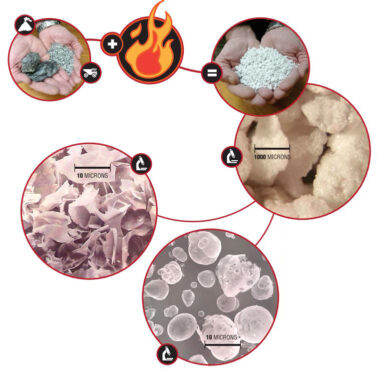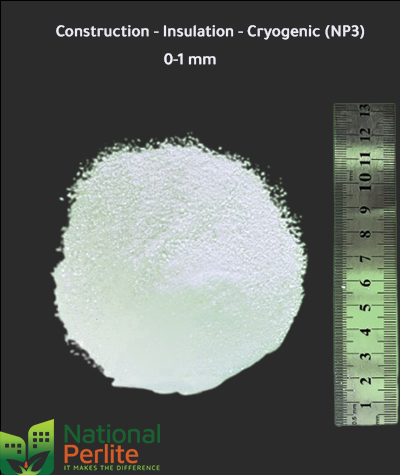

Insulation
The remarkable expansion of perlite ore, when subjected to rapid, controlled heating, not only multiplies its volume up to 20 times or more but also imparts it with exceptional insulating properties. This volumetric increase creates a complex internal structure within each perlite particle, consisting of numerous tiny air cells that dramatically reduce heat transmission. The expanded perlite thus becomes an outstanding thermal insulator, contributing significantly to energy conservation in buildings. It also serves as an effective sound barrier, dampening noise transmission through masonry walls. These characteristics make expanded perlite an indispensable material in constructing energy-efficient and acoustically sound residential and commercial spaces.
Learn More
Benefits of Perlite in Insulation
- Thermal Efficiency: Perlite’s unique cellular structure provides outstanding thermal insulation, reducing energy costs associated with heating and cooling.
- Sound Insulation: Its porous nature helps absorb sound, aiding in acoustic insulation and creating quieter indoor environments.
- Fire Resistance: Non-combustible and able to withstand high temperatures, perlite enhances the fire safety of insulated materials.
- Lightweight: Expanded perlite is light, which simplifies transport, handling, and application, and places less stress on structural supports.
- Moisture Resistance: Perlite is hydrophobic and does not absorb moisture, mitigating the risk of mold, fungus, and mildew in it systems.
- Eco-Friendly: Extracted with a minimal environmental footprint, perlite supports sustainable construction practices.
- Energy Savings: The durability and effectiveness of perlite insulation provide long-term savings on energy and maintenance costs. Investment will quickly pay back the cost of this and will decrease building heating and cooling costs for years to come.
- Non-Settling: Perlite retains its insulating properties and volume over time, unlike other materials that can settle or degrade.
- Chemically Inert: It remains stable and does not react with most chemicals, ensuring longevity and consistent performance.
- Versatile Applications: Suitable for use in loose-fill, rigid board, spray-on applications, and within concrete and plasters.
- Ease of Installation: Its versatility and ease of use make it applicable for new builds, retrofits, and complex architectural designs.
- Sustainable Practices: Perlite supports sustainable building practices, contributing to LEED certification and other green building standards due to its natural and low-impact production process.
Perlite for Insulation Applications
- Thermal Insulation & Fire Resistance Sprays: Perlite is infused in sprays for its excellent thermal insulation and inherent fire-resistant qualities, offering dual protection in one application.
- Readymix Concrete: Perlite is used in readymix concrete to enhance its insulating properties and to reduce the overall weight without compromising the structural integrity, which is particularly beneficial in creating lightweight architectural elements and for improving thermal efficiency in buildings.
- Precast Concrete: In precast concrete applications, perlite contributes to the production of lighter, thermally insulated panels and structures, streamlining the construction process with ready-to-install, energy-efficient components that support sustainable building practices.
- Pipe Insulation: Apply perlite for superior thermal insulation in piping systems, reducing heat loss and conserving energy.
- Building Materials: As a key ingredient in building materials, perlite contributes to the energy efficiency and fire safety of modern construction, from residential to commercial projects.
- Masonry Fill Insulation: Perlite is used as a masonry fill to provide high thermal insulation in block and cavity walls, enhancing building energy performance.
- Loose Fill Insulation: As a loose-fill, perlite is easy to install in attics, walls, and other hard-to-reach areas, improving thermal resistance and reducing energy consumption.
- Horticultural Insulation: In horticulture, perlite is used to insulate against extreme temperatures, protecting plant roots and aiding in the regulation of soil temperature.
- Ceramics and Glass Industry: Perlite is indeed used as an additive in these industries, often as a flux or for light weighting and insulating properties.
- Ship Floor Coating and Insulation: Perlite is indeed used as an additive in these industries, often as a flux or for light weighting and insulating properties.
- Drilling: In the drilling industry, perlite can be used to aid in cementation procedures due to its lightweight and insulating properties.
- Insulating Paints: Perlite is used in insulating paints to provide an extra layer of thermal protection, contributing to the overall energy efficiency of buildings.
- Insulating Coatings: Use perlite as a lightweight filler in coatings and plasters for enhanced thermal and acoustic insulation.
- Plasters: Perlite-infused plasters offer a smooth finish with improved insulation properties, ideal for both aesthetic and functional wall coatings.
- Ceiling Tiles: Perlite-infused ceiling tiles are not only aesthetically pleasing but also thermally and acoustically insulating.
- Fillers: Perlite serves as an inert filler, adding volume and improving the consistency of various construction materials without compromising quality.
- Plasterboard: Integrate perlite into plasterboard manufacturing for boards that are lighter, stronger, and offer better sound and fire insulates.
- Joint Compounds: Improve the bond and insulation of your construction joints with our premium perlite.
- Roofing Materials: Increase the lifespan and insulation of roofing systems with perlite, making them more energy-efficient and weather-resistant.
- Lightweight Insulating Concrete: Perlite is integral to lightweight insulating concrete, providing therma insulates and fire resistance while reducing the overall weight of concrete structures, ideal for both floors and roofing systems.
- Cryogenic Insulation: Perlite’s low thermal conductivity makes it an ideal insulator for cryogenic applications, providing essential it for storage tanks and transport vessels at temperatures as low as -269°C (-452°F).
- LNG Storage and Transportation: In the liquefied natural gas (LNG) sector, perlite is an essential material for insulating storage tanks and transportation containers. It maintains the extremely low temperatures required for LNG by providing superior, thereby ensuring the safe and efficient handling of this cryogenic liquid.
- Liquefied Petroleum Gas (LPG) Storage: Perlite is crucial in the insulation of LPG storage tanks. Its excellent thermal insulation properties help maintain the required low temperatures for LPG, reducing evaporation losses and enhancing the safety of storage facilities.
- Manufacturing of Insulated Panels: Perlite is incorporated into the production of insulated panels used in the construction of energy-efficient buildings. It contributes to the lightweight nature of the panels while providing significant thermal insulation, making the panels an integral part of green building designs.
Technical Features
| Attribute | Values |
|---|---|
| Density | 50 -60 kg/m3 (+-%10) |
| Grain Diameter | 0-1 mm |
| Chemical Composition | 0,040-0,045 Kcal/ mhC |
| Fusion Point | SiO2 %74 Al2O3 %14 Na2O %3 K2O %5 MgO %0.5 CaO %0.5 Fe2O3 %1 Not effected from acids and alkalines. PH-7 |
| Package | Alkali Oksitler Aksit ve Alkalilerden etkilenmez |
Why Perlite Is Effective: A Scientific Perspective
Perlite’s effectiveness is rooted in its unique physical properties. When heated to approximately 900°C (1,700°F), perlite’s volcanic glass softens, and its internal water vaporizes, causing an expansion that transforms the rock into a lightweight, porous material.
Versatile Functionality:
- Insulation: The expanded form of perlite consists of micro-bubbles, creating an insulative material that traps air and reduces thermal conductivity. This feature makes it ideal for insulation in the construction industry.
- Filtration: These same micro-pores effectively filter out impurities, making perlite an excellent filtration aid for liquids in various sectors, from food and beverage to wastewater treatment.
- Horticulture: In gardening and agriculture, perlite’s air pockets retain water and provide space for air, promoting root growth and improving soil structure without compaction.
- Industrial Uses: Perlite is also incorporated into lightweight plasters, concrete, and refractory materials, improving strength while maintaining a lighter weight.
- Consumer Products: Its gentle abrasiveness and absorbency make perlite a useful component in personal care products like exfoliants and a carrier in cleaning supplies.


